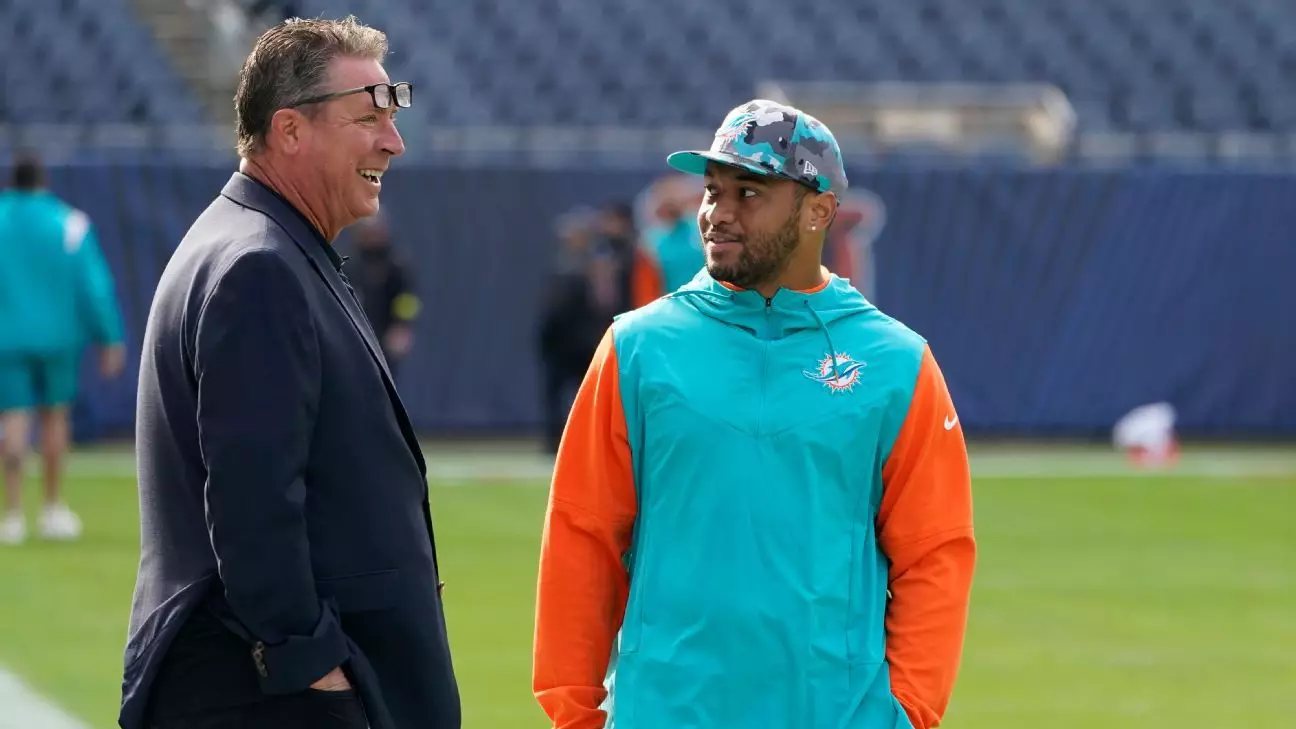In a recent episode of „The Pat McAfee Show,“ NFL legend Dan Marino lent his endorsement to Miami Dolphins quarterback Tua Tagovailoa, affirming his status as the franchise quarterback. However, Marino’s remarks were notably tinged with caution, emphasizing that achieving sustained success hinges on addressing Tagovailoa’s health concerns. The juxtaposition of Marino’s support alongside the pressing health issues faced by Tagovailoa encapsulates the dual nature of the current situation for the Dolphins.
Understanding Tua’s Injury Struggles
Tua Tagovailoa’s journey in the NFL has been marked by significant highs and troubling lows, particularly regarding injuries. Last season, he encountered a series of setbacks that relegated him to the sidelines for six games—four due to concussions and two more from what has been characterized variably by team sources. Tua’s injury history raises pertinent questions: what could have been if he had been consistently available? Despite these setbacks, Tagovailoa showcased remarkable skill, leading the league with a 72.9% completion rate despite his absences. This statistical success starkly contrasts with the fragility of his on-field presence, highlighting the precarious balance he must navigate in maintaining his career.
Marino’s thoughtful discourse about ensuring Tagovailoa’s health serves as a reminder that the quarterback’s physical well-being is a prerequisite for the Dolphins as they aim for playoff contention. The veteran quarterback’s concern echoes the sentiments of many analysts who recognize that talent alone is insufficient without consistent participation.
Dolphins general manager Chris Grier’s acknowledgment of Tagovailoa’s need for improved availability reflects a broader understanding that the team must provide a supportive and protective environment for their star athlete. The emphasis on Tua learning how to protect himself during games is a vital directive. This initiative extends beyond the quarterback to involve the entire coaching staff, who must strategize around Tagovailoa’s playing style to minimize injury risks.
In light of the types of injuries Tagovailoa has faced, particularly concussions, there must be a concerted effort within the Dolphins organization to enhance player safety protocols. Modifications in gameplay techniques, training regimens, and perhaps even offensive schemes could collectively contribute to lowering the incidence of injuries for Tagovailoa moving forward. The organizational focus on preserving Tagovailoa’s health can also influence the team’s prospects for sustained success in the future.
While Marino’s support of Tagovailoa is clear, he and other Dolphins stakeholders recognize that assembling a robust roster capable of compensating for potential time lost to injury is equally important. The franchise is at a critical juncture; they must find additional offensive resources and depth that can help cushion the blow should Tagovailoa miss more games.
One avenue for this is investing in an offensive line that can better protect the quarterback, thus diminishing the frequency of hits he faces, especially from defenders intent on exploiting rushing opportunities. Revisiting the depth chart and potentially securing backup quarterback options will also ensure that the team is prepared for the unpredictable nature of injuries.
As Tagovailoa goes into the offseason, he must take deliberate steps to safeguard his body and optimize his physical state. While the spotlight on his stats was impressive—like leading the league in passing yards during a season where he played all games—sustaining that performance requires resilience and adaptability.
Ultimately, Tua Tagovailoa’s future as the Miami Dolphins‘ quarterback may revolve around effective injury management as much as his inherent talent. The journey ahead is not solely about record-breaking numbers but also about strategic game time, rigorous health protocols, and a franchise willing to support him through the ups and downs.
As Marino cogently noted, the focus needs to remain on keeping Tagovailoa healthy. Only through a collaborative effort between the quarterback, coaching staff, and management can the Dolphins hope to realize the potential many believe this dynamic player possesses. The intricate nature of the game demands resilience, and for Tua, it must also involve self-preservation to ensure he can continue to lead the Dolphins into a promising future.


Napsat komentář